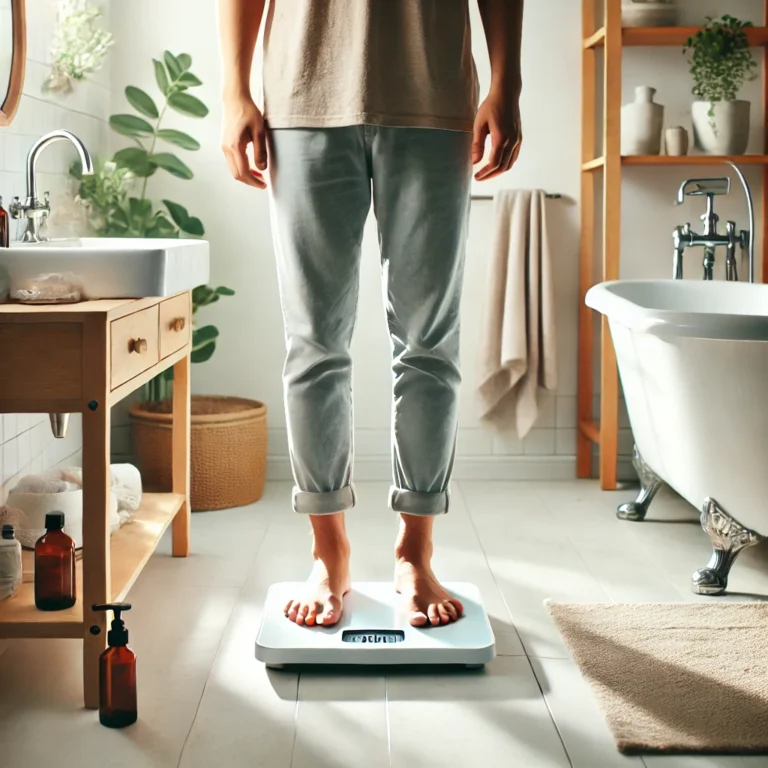Crohn’s disease is full of surprises—and not all of them are the good kind. If you’ve been dealing with unexpected weight gain, you’re not alone. It’s one of those issues no one really talks about, but weight gain with Crohn’s disease is more common than you might think.
I’ve been there, staring at the scales and thinking, How is this even possible? With Crohn’s, you’d expect weight loss to be the bigger challenge, not the other way around. But weight gain can be just as frustrating, especially when it feels like it’s happening for reasons out of your control.
What Causes Weight Gain with Crohn’s Disease?
First, let’s bust a myth: weight gain isn’t about you “failing” at anything. When Crohn’s disease and weight gain intersect, it’s almost never that simple.
- Medications Can Be a Factor: Steroids like prednisone are a lifesaver during flares, but they can ramp up your appetite and make your body store more fat. It’s not you—it’s the meds.
- Healing Changes the Rules: When your Crohn’s disease is in remission, your body absorbs nutrients more effectively. That’s great for your health, but if you’re eating the same way you did during a flare, you might find yourself gaining weight unexpectedly.
- Fatigue Slows Things Down: Crohn’s fatigue isn’t just being tired—it’s a bone-deep exhaustion that makes moving feel impossible some days. Less movement means fewer calories burned, and the numbers on the scale can start creeping up.
- Comfort Eating Is Real: Let’s be honest—Crohn’s is stressful. And when the chips are down (sometimes literally), food can be an easy source of comfort.
Sound familiar? It’s not your fault—it’s your body doing its best to adapt to everything it’s been through.
Is It Weight Gain or Just Bloating with Crohn’s Disease?
Before you beat yourself up over what might be on the scale, let’s talk about bloating. It’s incredibly common with Crohn’s and can sometimes be mistaken for weight gain.

So how do you know which one you’re dealing with?
- Bloating: This comes with that tight, uncomfortable feeling—your belly might even look visibly swollen. It’s often caused by gas, fluid retention, or certain trigger foods.
- Weight gain: This is more gradual and doesn’t usually come with the same physical discomfort.
Some common reasons for bloating with Crohn’s disease include:
- Trigger Foods: Everyone’s gut is different, but things like beans, dairy, or high-fibre vegetables can cause trouble for a lot of us.
- Steroid Use: These meds don’t just increase appetite—they can also make you retain water, which adds to that bloated feeling.
- Gut Imbalance: If your microbiome is off, you might experience more gas or bloating than usual.
One thing that’s helped me is keeping a food diary. It’s not glamorous, but writing down what you eat and how you feel after can reveal patterns you might not notice otherwise.

The Role of Inflammation in Weight Gain with Crohn’s Disease
Crohn’s isn’t just a “gut issue”—it’s a full-body condition, and inflammation plays a massive role in how your weight fluctuates.
- Creeping Fat: This is where fat builds up around your intestines in response to inflammation. It’s your body’s way of trying to protect itself, but it can also contribute to weight gain.
- Stress Hormones at Work: Inflammation triggers cortisol, which tells your body to store energy as fat—just in case it needs it later.
- Metabolic Changes: Chronic inflammation can slow down how your body processes food, making it easier to gain weight.
While it’s frustrating, these are all your body’s attempts to protect and heal itself.
Why Losing Weight with Crohn’s Is Harder
If you’ve ever tried to lose weight with Crohn’s, you know it’s not as straightforward as cutting calories or hitting the gym. Crohn’s throws some unique challenges into the mix.
- You Can’t Cut Corners on Nutrition: Skipping meals or drastically cutting calories isn’t an option. Your body needs a steady supply of nutrients to function and heal.
- Fatigue and Pain Slow You Down: Some days, getting off the sofa feels like a victory. Adding a workout on top of that? Not likely.
- Flare-Ups Throw Everything Off: Just when you feel like you’re making progress, a flare can derail your plans.
How to Manage Weight Without Triggering a Flare
Managing weight with Crohn’s is about balance. It’s not about quick fixes or crash diets—it’s about sustainable changes that work for your body and your condition.
Here are a few things that have worked for me:
- Work with a Specialist: A dietitian who understands Crohn’s can help you create a plan that balances your nutritional needs with your weight goals.
- Stick to Gut-Friendly Foods: Cooked vegetables, lean proteins, and low-fibre carbs like rice and potatoes are staples for me.
- Focus on Portion Control: If your appetite is out of control thanks to steroids, smaller, more frequent meals can help.
- Move in Ways That Feel Good: Gentle activities like walking or yoga are great for keeping active without pushing your body too hard.
- Stay Hydrated: Sometimes what feels like hunger is actually thirst. Plus, staying hydrated helps with bloating.
FAQs About Crohn’s and Weight Gain
Yes, it absolutely can. Medications, better nutrient absorption, and reduced activity are all common reasons why.
Focus on portion control, gentle exercise, and gut-friendly foods. Working with a dietitian can help tailor a plan that meets your needs.
Bloating might be caused by fluid retention, trigger foods, or inflammation. Tracking what you eat and how you feel can help identify the cause.
Final Thoughts
Weight gain with Crohn’s is complicated. It’s not about laziness or lack of willpower—it’s your body’s way of adapting to the challenges it’s facing. While it can be frustrating, understanding why it happens can help you take steps to manage it effectively.
Start small. Focus on the things you can control, whether that’s trying out new foods, finding movement that feels good, or just being kinder to yourself on the tough days. You might also explore some Crohn’s diet recipes to enjoy nourishing meals without triggering symptoms. You’re not alone in this, and every little step you take is progress.
For more advice and support, visit Crohn’s & Colitis UK.
Remember, you’re doing your best—and that’s enough.





